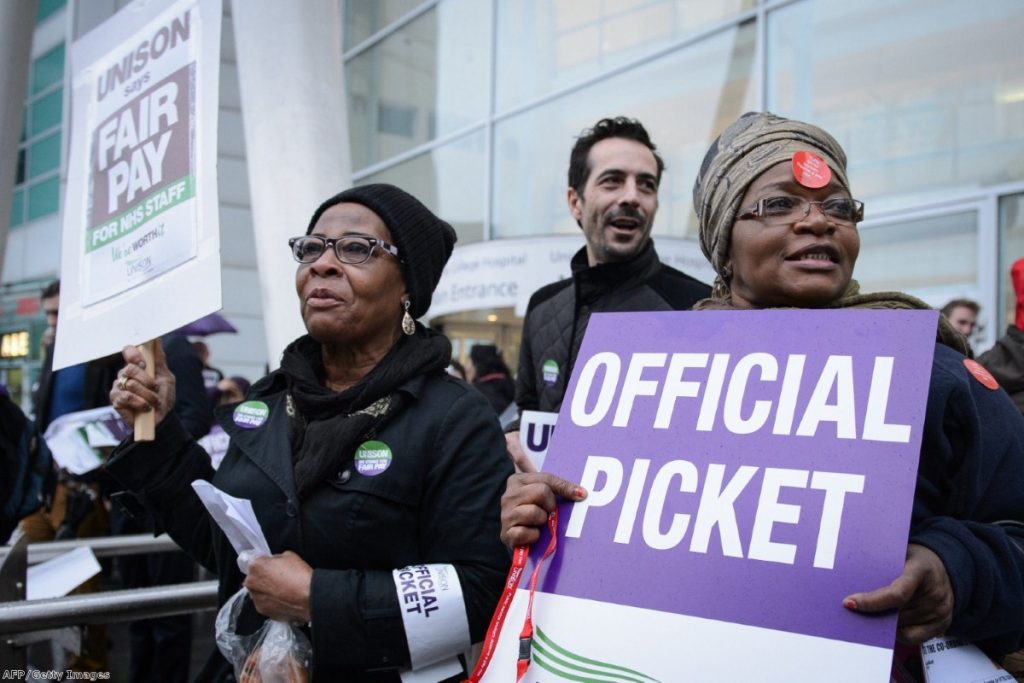NHS strike: A walkout by people who care about you
'Give us more pay,' the NHS workers strike today is supposedly going, 'or the patients get it'. But the truth is that the conduct of these compassionate, caring workers couldn't be more different.
It's an odd sort of tension. Usually, brinksmanship is the basic idea of any industrial action. A walkout, in order to secure its full effect, is about the withdrawal of a critical service in order to give those in charge a serious jolt. The very people who we turn to for help when we are most vulnerable are supposed to fold up their arms and shake their heads. They must deliver a stark rebuff to the politicians and civil servants, who have refused to implement a one per cent pay rise recommended by an independent board. What this strike is supposed to show is that they can't just go on relying on these people indefinitely.
Ambulance staff on strike outside Taunton Station #13Oct #NHSPay pic.twitter.com/buRaOL9juK
— UNISON South West (@UNISONSW) October 13, 2014
Today's four-hour strike is a big deal. It is the first time anything like this has happened for over 30 years. And judging by the press coverage you'd think these staff had suddenly transformed from being our nation's favourite workforce to a bunch of cold, heartless villains. That couldn't be further from the truth.
Something of a theme emerges when you look at the brinksmanship of the striking NHS staff. Take Unison, the largest union involved in today's strike. Its message is that "we don't feel valued or respected by our employers or the health minister". But it explains, in a tone of deep apology, that "we felt it was important to explain the reason we are taking action today". And it says:
"We haven't taken this decision lightly, and we will do our best to ensure that patients are safe, but there will be disruption to your health services today."
The subclause here – that the striking NHS staff want to make sure their patients are safe – takes just the right amount of sting out of this strike. It is not about hurting patients, it's about hurting the bosses.
Here's a message from UNISON members working in your local NHS: pic.twitter.com/JSQIHkvaWW I'm with them all the way today.
— tom_watson (@tom_watson) October 13, 2014
The most hardnosed might call this the language of equivocation. But NHS workers care too much. It is in their DNA. It is certainly why they are in the work they are. They don't do their job because they are motivated by money. They are not in the City making deals or selling secondhand cars. They are dealing with other people's revolting bodily fluids because they care. They are not the kind of people who are very good at being brutal.
The same theme appears again and again.
The GMB union agreed that renal dialysis and oncology patients will be responded to when they call for help in the north-west. The major and hazardous incident team remained on duty, just in case.
The Royal College of Midwives made clear that midwives will continue to care for women and babies and prioritise patient safety.
NHS workers on the picket line warn of future disruption to make their point on pay #NHSstrike http://t.co/UQMSd5TKbb pic.twitter.com/etUOei7AGb
— BBC Radio 5 live (@bbc5live) October 13, 2014
UCATT, the construction union, said: "The safety of patients is paramount, therefore if your workplace rep agrees that you are required to work during the stoppage then you will attend work at that time."
And the Unite union, in its information for employers and managers, stated that its members "will always put patient safety first". Proper emergency cover was provided as a result, but only in line with the service you'd expect to see on Christmas Day or any other bank holiday.
Its notes for ambulance operators states that members should only respond to 'RED' calls. This appears to be the frontline of the strike – the sensitive blurred area where managers request additional cover for non-emergency work. The union resorts to threats here. "Trusts should be informed locally that if Green or lower grade calls are upgraded, without good reason," it warns, "Unite will reconsider offering this exemption in future action."
All this paints a picture of a civilised and sensitive strike action. A full and complete walkout would be something to write about. People would lose their lives as a result. In stark political terms, that would be counterproductive. In human terms, it would be unthinkable for this group of workers.
So they are going ahead with giving ministers a jolt, without making it an unacceptably painful one. It will certainly create enough chaos to make their point, but it does not mean the NHS itself is suspended for four hours.
It is exactly what you'd expect from a bunch of people who have devoted their lives to helping others.





-01.png)